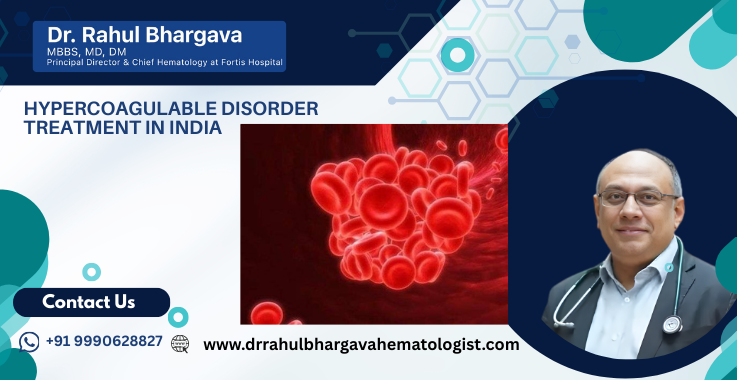Hypercoagulable Disorder Treatment in India

Hypercoagulable disorder, also known as a thrombophilia, refers to a condition where there is an increased tendency for the blood to form abnormal clots (thrombosis). This can occur in veins (venous thromboembolism, such as deep vein thrombosis [DVT] or pulmonary embolism [PE]) or arteries (arterial thrombosis). The condition can result from genetic factors, acquired conditions, or a combination of both. The hypercoagulable state increases the risk of blood clots, which can have severe, life-threatening consequences such as stroke, heart attack, and pulmonary embolism.
Hypercoagulable disorders are typically asymptomatic until a thrombotic event occurs. Identifying and managing these conditions is essential for preventing serious complications.
Hypercoagulable Disorder
Hypercoagulable disorder, also known as thrombophilia, is a condition where the blood has an increased tendency to form clots. While clotting is a normal response to injury, in people with hypercoagulable disorders, blood clots can develop abnormally within blood vessels, leading to health risks like deep vein thrombosis (DVT), pulmonary embolism, and stroke.
Dr. Rahul Bhargava, an expert in managing blood disorders, offers comprehensive care for individuals with hypercoagulable conditions to prevent complications and improve quality of life.
Causes of Hypercoagulable Disorder
There are various factors that can lead to a hypercoagulable state, broadly categorized into genetic and acquired causes:
-
Genetic Causes
- Factor V Leiden mutation
- Prothrombin gene mutation
- Protein C, Protein S, or Antithrombin deficiency
-
Acquired Causes
- Prolonged immobility or surgery
- Pregnancy or use of birth control pills
- Cancer
- Obesity
- Autoimmune disorders like lupus or antiphospholipid syndrome
Types of Hypercoagulable Disorders
Hypercoagulable conditions can be classified based on their origin:
-
Inherited Thrombophilias
These are genetic conditions passed from parents to children. Common examples include Factor V Leiden and Prothrombin G20210A mutation. -
Acquired Thrombophilias
These develop due to external factors such as medical conditions or medications. A well-known example is antiphospholipid syndrome. -
Mixed Thrombophilias
Some patients may have both inherited and acquired risk factors, further increasing their risk of abnormal clot formation.
Symptoms of Hypercoagulable Disorder
Symptoms of hypercoagulable disorders may not always be obvious until a blood clot forms. Key symptoms to watch out for include:
- Deep Vein Thrombosis (DVT): Swelling, pain, redness, or warmth in the leg
- Pulmonary Embolism: Shortness of breath, chest pain, rapid heartbeat, coughing up blood
- Stroke: Sudden numbness, weakness, or difficulty speaking
If you experience any of these symptoms, it’s crucial to seek immediate medical attention.
Diagnosis of Hypercoagulable Disorder
At Dr. Rahul Bhargava’s clinic, a thorough diagnosis involves:
-
Medical History and Physical Examination
Detailed evaluation of personal and family history of blood clots. -
Blood Tests
Specialized tests like the D-dimer test, Factor V Leiden mutation test, and others help confirm the presence of clotting disorders. -
Imaging Tests
Ultrasound, CT scan, or MRI may be used to detect existing blood clots.
Early diagnosis is key to managing hypercoagulable disorders and preventing severe complications.
Treatment of Hypercoagulable Disorder
Treatment options for hypercoagulable disorders focus on preventing the formation of new clots and managing existing ones. The approach is tailored based on the underlying cause and individual health needs.
-
Blood Thinners (Anticoagulants)
Medications such as warfarin, heparin, or direct oral anticoagulants (DOACs) are commonly prescribed to reduce the risk of clotting. -
Lifestyle Changes
Regular physical activity, maintaining a healthy weight, and avoiding smoking can reduce the risk of clot formation. -
Compression Stockings
Used to prevent DVT in people with prolonged immobility or travel. -
Regular Monitoring
Routine blood tests and follow-ups with Dr. Bhargava ensure that the treatment is effective and adjustments can be made if necessary.
Cost of Treatment and Stay in India
The cost of treating hypercoagulable disorders in India is relatively affordable compared to many Western countries, making it a popular choice for medical tourism. The total cost of treatment, including diagnostic tests, medications, and hospital stay, can vary depending on the specific condition and the complexity of treatment. Here’s an overview of the costs:
-
Initial Consultation:
USD: $30 – $100
INR: ₹2,200 – ₹7,400 -
Blood Tests (D-dimer, Factor V Leiden, etc.):
USD: $50 – $200
INR: ₹3,700 – ₹14,800 -
Anticoagulant Medications (per month):
USD: $50 – $300
INR: ₹3,700 – ₹22,200 -
Compression Stockings (per pair):
USD: $20 – $100
INR: ₹1,500 – ₹7,400 -
Hospital Stay (per night):
USD: $25 – $150
INR: ₹2,000 – ₹11,000
India’s healthcare system offers high-quality care at a fraction of the cost compared to many Western countries, making it a viable option for those seeking treatment for hypercoagulable disorders. The overall cost will depend on the specific needs of the patient and the duration of the treatment plan
Frequently Asked Questions
A hypercoagulable disorder is a condition where the blood has an increased tendency to form clots, which can lead to complications like DVT, stroke, or pulmonary embolism.
While there is no complete cure, hypercoagulable disorders can be managed effectively with medications, lifestyle changes, and regular monitoring.
The duration of anticoagulant therapy depends on the cause of the hypercoagulable disorder and the risk of future clots. Some patients may need short-term treatment, while others require lifelong management.